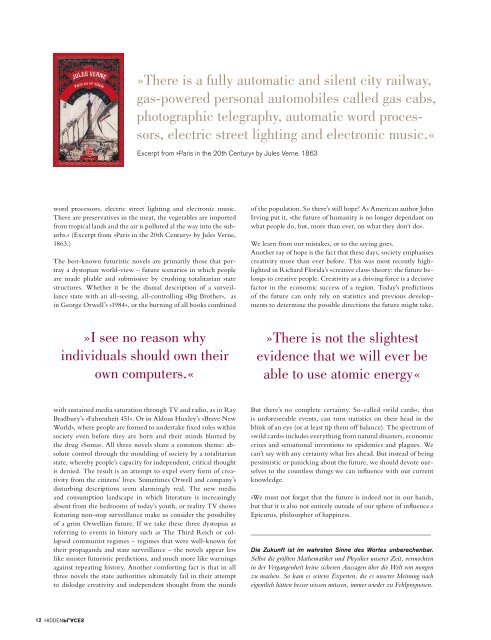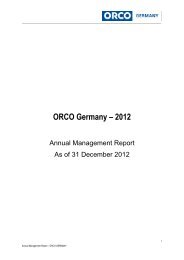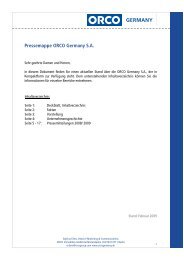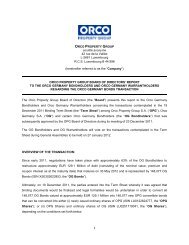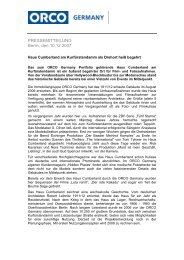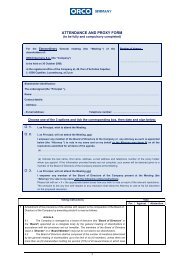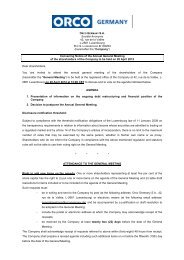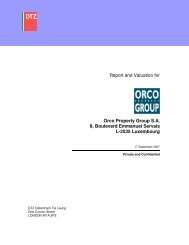PDF; 6,67 MB - ORCO Germany
PDF; 6,67 MB - ORCO Germany
PDF; 6,67 MB - ORCO Germany
Sie wollen auch ein ePaper? Erhöhen Sie die Reichweite Ihrer Titel.
YUMPU macht aus Druck-PDFs automatisch weboptimierte ePaper, die Google liebt.
»There is a fully automatic and silent city railway,<br />
gas-powered personal automobiles called gas cabs,<br />
photographic telegraphy, automatic word processors,<br />
electric street lighting and electronic music.«<br />
excerpt from »Paris in the 20th Century« by Jules Verne. 1863<br />
word processors, electric street lighting and electronic music.<br />
There are preservatives in the meat, the vegetables are imported<br />
from tropical lands and the air is polluted al the way into the suburbs.«<br />
(excerpt from »Paris in the 20th Century« by Jules Verne,<br />
1863.)<br />
The best-known futuristic novels are primarily those that portray<br />
a dystopian world-view – future scenarios in which people<br />
are made pliable and submissive by crushing totalitarian state<br />
structures. Whether it be the dismal description of a surveillance<br />
state with an all-seeing, all-controlling »Big Brother«, as<br />
in George Orwell’s »1984«, or the burning of all books combined<br />
»I see no reason why<br />
individuals should own their<br />
own computers.«<br />
with sustained media saturation through TV and radio, as in Ray<br />
Bradbury’s »Fahrenheit 451«. Or in Aldous Huxley’s »Brave New<br />
World», where people are formed to undertake fixed roles within<br />
society even before they are born and their minds blurred by<br />
the drug »Soma«. All three novels share a common theme: absolute<br />
control through the moulding of society by a totalitarian<br />
state, whereby people’s capacity for independent, critical thought<br />
is denied. The result is an attempt to expel every form of creativity<br />
from the citizens’ lives. Sometimes Orwell and company’s<br />
disturbing descriptions seem alarmingly real. The new media<br />
and consumption landscape in which literature is increasingly<br />
absent from the bedrooms of today’s youth, or reality TV shows<br />
featuring non-stop surveillance make us consider the possibility<br />
of a grim Orwellian future. If we take these three dystopias as<br />
referring to events in history such as The Third Reich or collapsed<br />
communist regimes – regimes that were well-known for<br />
their propaganda and state surveillance – the novels appear less<br />
like sinister futuristic predictions, and much more like warnings<br />
against repeating history. Another comforting fact is that in all<br />
three novels the state authorities ultimately fail in their attempt<br />
to dislodge creativity and independent thought from the minds<br />
of the population. So there’s still hope! As American author John<br />
Irving put it, »the future of humanity is no longer dependant on<br />
what people do, but, more than ever, on what they don’t do«.<br />
We learn from our mistakes, or so the saying goes.<br />
Another ray of hope is the fact that these days, society emphasises<br />
creativity more than ever before. This was most recently highlighted<br />
in Richard Florida’s »creative class« theory: the future belongs<br />
to creative people. Creativity as a driving force is a decisive<br />
factor in the economic success of a region. Today’s predictions<br />
of the future can only rely on statistics and previous developments<br />
to determine the possible directions the future might take.<br />
»There is not the slightest<br />
evidence that we will ever be<br />
able to use atomic energy«<br />
But there’s no complete certainty. So-called »wild cards«, that<br />
is unforeseeable events, can turn statistics on their head in the<br />
blink of an eye (or at least tip them off balance). The spectrum of<br />
»wild cards« includes everything from natural disasters, economic<br />
crises and sensational inventions to epidemics and plagues. We<br />
can’t say with any certainty what lies ahead. But instead of being<br />
pessimistic or panicking about the future, we should devote ourselves<br />
to the countless things we can influence with our current<br />
knowledge.<br />
»We must not forget that the future is indeed not in our hands,<br />
but that it is also not entirely outside of our sphere of influence.«<br />
epicurus, philosopher of happiness.<br />
____________________________________________________<br />
Die Zukunft ist im wahrsten Sinne des Wortes unberechenbar.<br />
Selbst die größten Mathematiker und Physiker unserer Zeit, vermochten<br />
in der Vergangenheit keine sicheren Aussagen über die Welt von morgen<br />
zu machen. So kam es seitens Experten, die es unserer Meinung nach<br />
eigentlich hätten besser wissen müssen, immer wieder zu Fehlprognosen.<br />
»In the year 2010 everyone<br />
will simply fly through the<br />
streets.«<br />
Der damalige Vorstandsvorsitzende von IBM, Thomas T. Watson,<br />
gab 1943 beispielsweise an: »Ich sehe keinen Grund, warum einzelne<br />
Individuen ihren eigenen Computer haben sollten.« Heute können wir<br />
über solche Aussagen allenfalls schmunzeln, beweisen sie doch, dass sich<br />
selbst die klügsten Köpfe irren können. Nichtsdestotrotz gab es in der<br />
Vergangenheit auch immer wieder Prognosen, die erstaunlich genau waren.<br />
Verblüffend sind beispielsweise die Beschreibungen von zukünftigen<br />
innovativen Entdeckungen und Erfindungen in dem erst kürzlich<br />
entdeckten Roman »Paris im 20. Jahrhundert« von Jules Verne. 1863<br />
geschrieben, handelt Vernes Roman vom zukünftigen Paris im Jahre<br />
1963.<br />
»Da gibt es eine voll automatisierte und geräuschlose Stadtbahn, Gas<br />
betriebene Personenkraftwagen, Gas-Cabs genannt, die Photografische<br />
Telegrafie, Schreibautomaten, elektrische Straßenbeleuchtung und elektronische<br />
Musik. Im Fleisch sind Konservierungsmittel, die Gemüsesorten<br />
stammen vom Äquator und die Luft ist bis in die Vorstädte verschmutzt.«<br />
(Zitat Klappentext).<br />
Die bekanntesten Zukunftsromane sind vor allem solche, die dystopische<br />
Weltanschauungen beschreiben. Zukunftsszenarien, in denen die Menschen<br />
in totalitären Staatsstrukturen leben und gefügig und willenlos<br />
gemacht werden. Ob in George Orwells »1984«, der düsteren Erzählung<br />
von einem Überwachungs- und Präventionsstaat mit seinem alles<br />
sehenden und kontrollierenden »Big Brother«, die Verbrennung sämtlicher<br />
Bücher und Schriften kombiniert mit anhaltender Medienbeschallung<br />
durch TV und Radio in Ray Bradburys »Fahrenheit 451« oder<br />
Aldous Huxleys »Schöne neue Welt«, in der die Menschen schon als<br />
Fötus auf eine festgelegte Rolle in der Gesellschaft genormt werden und<br />
die Droge »Soma« ihren Verstand vernebeln: Alle drei Romane haben<br />
eines gemeinsam – die absolute Kontrolle durch eine totalitäre Staatsgewalt<br />
formt eine Gesellschaft, in der den Menschen die Gabe des selbstständigen<br />
und kritikfähigen Denkens abgesprochen wird. Erreicht wird<br />
dies, indem man jegliche Form von Kreativität aus dem Leben dieser<br />
Staatsbürger zu verbannen versucht. Teilweise sind die Beschreibungen<br />
Orwells & Co tatsächlich erschreckend real. Insbesondere im Hinblick<br />
auf Reality-TV-Shows, in denen Menschen rund um die Uhr von Kameras<br />
überwacht werden oder Medien- und Konsumlandschaften, die<br />
die Literatur immer mehr aus unseren Jugendzimmern verbannen, fragt<br />
man sich, ob uns tatsächlich eine solch dunkle Zukunft bevorsteht. Geht<br />
man davon aus, dass sich alle drei Dystopien auf bereits vergangene<br />
geschichtliche Ereignisse, wie das Dritte Reich und gescheiterte kommunistische<br />
Regime, beziehen, die bekannt waren für ihre Propaganda<br />
und Staatsüberwachung, erscheinen uns die Romane weniger als böse<br />
Futurologist Matthias Horx on the fear of the future: »We can only imagine the fu-<br />
ture as an apocalypse, a consumption hell or an absurd comic strip. But if we were there,<br />
it would prove to be a perfectly normal place for loving, marrying, driving cars and having<br />
children. The most radical changes will concern our perspective on the world. First we<br />
contemplated the world as a cave, later as a village and then a factory. Today we basically<br />
look into outer space, so it’s not surprising that we sometimes feel dizzy.<br />
You can only really understand the future when you stop shouting and moaning and<br />
dumping your responsibilities on other people …«<br />
»We should try to shape the future using our judgement. We’ll see the way it turns out.«<br />
__________________________________________________________________<br />
Matthias Horx, Zukunftsforscher, zum Thema Zukunftsängste: »Wir können uns die<br />
Zukunft immer nur als Apokalypse, Konsumhölle oder absurden Comic-Strip vorstellen.<br />
Wenn wir aber einmal dort sind, wird sie sich als ganz normaler Ort zum Lieben, Heiraten,<br />
Autofahren und Kinderkriegen erweisen. Die radikalsten Veränderungen betreffen die<br />
Blickwinkel, mit denen wir auf die Welt schauen. Zuerst haben wir die Welt aus der Höhle<br />
betrachtet, später aus dem Dorf und dann aus der Fabrik. Heute blicken wir im Grunde<br />
alle aus dem Weltraum auf die erde. Kein Wunder, dass uns bisweilen schwindelig wird.<br />
Die Zukunft versteht man nur, wenn man mit Geschrei, Gejammer und dem Übertragen<br />
der Verantwortung an andere aufhört …«<br />
»Wir sollten versuchen, die Zukunft nach unserem ermessen zu gestalten. Was am ende<br />
dabei herauskommt, werden wir ja sehen.“<br />
12 13


